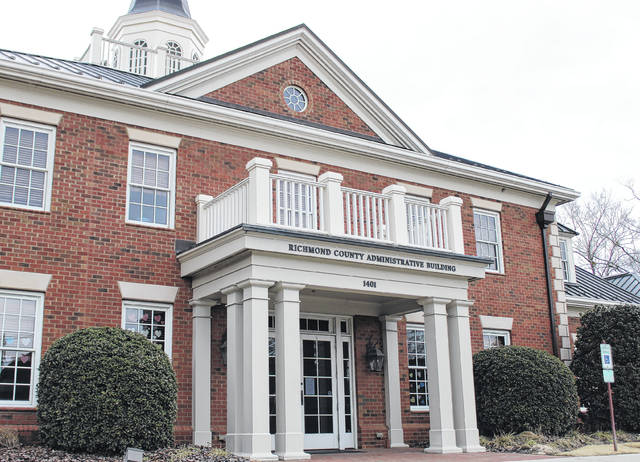
Daily Journal file photo
The county officials engaged in the mediation have been doing so remotely from the Richmond County Administration Building on Fayetteville Road.
ROCKINGHAM — The mediation between Richmond County and the cities of Rockingham and Hamlet regarding what the cities allege was a breach of contract by the county has concluded with a “tentative agreement” to discuss a solution to the battle over the sales tax distribution method, according to city and county officials with knowledge of the discussions.
The parties in the mediation met on Thursday for their second such meeting since the cities requested the mediation in June 2020. Media has not been given access to the meetings themselves because a majority of the members of the government entities’ respective boards have not been present.
Hamlet City Manager Matthew Christian confirmed Friday that mediation is done, but future litigation is still on the table if the two sides cannot agree on a compromise on the sales tax distribution method. The county’s attorney is expected to provide formal acknowledgement of the end of mediation next week, according to Christian.
This compromise will entail some form of “revenue sharing” between the county and the six municipalities to sooth the wounds caused by the county switching from a per capita distribution method to ad valorem in April 2020, according to Christian.
This change caused much more losses for the municipalities and much more new sales tax revenue for the county than County Manager Bryan Land initially projected.
Board of Commissioners Chair Jeff Smart confirmed Friday that some form of expense or revenue sharing will be discussed in lieu of the talks over the breach of contract.
“We will continue our talks with the municipalities to try to find solutions for everyone’s revenues to meet expenses,” Smart said in a text Friday. “This may result in revenue or expense sharing depending on the subject.
“The mediation setting (Thursday) provided another opportunity for positive conversation between the County and the Municipalities,” Smart continued. “I look forward to future dialogue that will continue to benefit all Richmond County citizens.”
Christian confirmed that while the mediation over breach of contract is over with, the lawsuit over the rezoning of a property on a property on Marks Creek Church Road to Heavy Industrial — filed by the City of Hamlet, Town of Dobbins Heights, and four local residents against the county — will continue.
Past ideas for solutions
The notion of some kind of “sharing of the burden” has been put forward multiple times since the county changed to ad valorem. All six municipalities in the county passed resolutions in April 2020 calling on the county to go back to per capita and instead raise taxes, which would impact both county and city residents, in order to make the revenue gains the county was seeking. But the county didn’t budge.
Then-Commissioner Ben Moss, who has since been elected to represent District 66 in the NC House, posted on Facebook in May 2020 saying that if the county saw a higher revenue than the $675,000 County Manager Bryan Land predicted would come from the change to ad valorem — as the Department of Revenue projected they would to the tune of $1.8 million in new revenue, which was just shy of the roughly $1.9 million the county actually saw from May to December — then the excess revenue should be returned to the municipalities.
“This is a way of me saying that I think that our numbers may be more realistic, so what would it hurt if we did say, hypothetically, that we could redistribute the money that was over what we’ve estimated that we would actually generate off of the change?” Moss told the Daily Journal. “I’m not saying Mr. Land’s numbers are wrong, but this could better help the municipalities plan their budgets out if this was a choice — this hybrid-type method.”
No other county officials made any public statements regarding Moss’s idea.
Commissioners Rick Watkins and Tavares Bostic voiced their support for pursuing a third-party review of “taxation in Richmond County,” which would involve the county and municipalities joining together to hire an accounting firm and would have been completed by Feb. 1, 2021, according to the terms of Watkins’s initial motion.
Since then, the Daily Journal has reached out to municipal leaders on multiple occasions, and to date none of them were ever contacted regarding this idea.
Municipal leaders argue that the independent work done by Ken Anderson in recent weeks, a CPA with Anderson Smith & Wike, PLLC who has conducted the audits of all six municipalities, is sufficient to constitute a third party review. They said the same thing about the Department of Revenue’s figures last year, except those were projections, while Anderson’s are based on the actual sales tax revenue reported by the state up to the most recent data available.
At the March Board of Commissioners meeting last week, Rockingham Mayor Steve Morris suggested that, if there were to be a resolution on the sales tax distribution issue, the issue of the breach of contract would be null and void.
“If we got the sales tax back, I imagine (the possibility of litigation over breach of contract) would go away because our problems would be resolved as easy as that,” Morris told the Board of Commissioners.
The only other member of the Board of Commissioners to put forward the possibility of “concessions” is Vice Chair Justin Dawkins. Following a presentation of a joint statement from all six municipalities along with data put together with the help of Anderson — which showed that the county received $1,975,879.03 in new sales tax revenue in eight months under ad valorem, as opposed to Land’s projection of $675,000 annually — Dawkins said he agreed with the municipalities’ calculations.
Dawkins added that this gap in the projection and the reality will “require some concessions,” though he didn’t specify who would make those, nor whether it would be under per capita or ad valorem.
What’s at stake in the mediation
The mediation was triggered by the municipal officials taking issue with County Manager Bryan Land’s justification for the change to an ad valorem sales tax distribution method prior to the Board of Commissioners voting on it.
Land cited new expenses the county had taken on from the cities due to the consolidation of 9-1-1 services at the new Emergency Services Complex and suggested that the cities’ refusal to help cover these expenses as a reason why this change was needed. However, the Daily Journal reported that the cities had signed an interlocal agreement with the county in 2015 in which the parties agreed that the new 9-1-1 Center would be “self-sufficient” and “financed by 9-1-1 fees, grants and funds provided by the county.”
Another portion of the agreement signed by both cities states that, “The County will not charge (Rockingham or Hamlet) any fees for taking over their call taking and dispatch functions.”
The Daily Journal reported last year that Land emailed then-Hamlet City Manager Jonathan Blanton in 2018 seeking funds to help pay for the salaries of four dispatchers, who were previously Hamlet employees but were re-hired by the county.
In the letter requesting mediation, the cities stated that they were prepared to file suit against the county “immediately” in the Richmond County Superior Court, but first sought mediation in accordance with Section R of the initial agreement signed regarding the 9-1-1 Center.
If litigation becomes necessary, the cities intend to name the current and former members of the Richmond County Board of Commissioners and the current and former county managers in their official and individual capacities, making them liable for damages awarded to the cities, according to the letter.
“We would seek a jury trial, and we intend to allege breach of contract, actual fraud, constructive fraud, negligence, gross negligence, civil conspiracy, negligent misrepresentation, unfair and deceptive trade practices, and negligent supervision,” reads the letter.
The cities calculated their damages for the 2020-2021 fiscal year relating to the breach of contract to be nearly $500,000. This amount represents the salaries for dispatch staff that the cities argue the county has attempted to make them responsible for by changing to an ad valorem sales tax distribution method. These damages could be tripled under the North Carolina Unfair and Deceptive Trade Practices Act, according to the counsel for the cities.
The two cities are being represented by T.C. Morphis Jr. of The Brough Law Firm. Morphis is also the city attorney of Hamlet.
The letter, delivered last summer, argued that public comments by county officials “have made it clear that the County intends to use some or all of the funds it will acquire through the ad valorem tax distribution method to finance the (9-1-1 Center). In effect, the County will be charging the Cities fees to operate the Center in violation of the Agreements.”
To support the Richmond County Daily Journal, subscribe at https://www.yourdailyjournal.com/subscribe.
Reach Gavin Stone at 910-817-2673 or [email protected].






